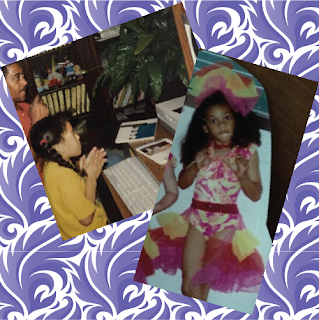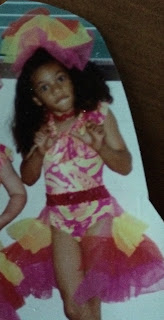You don't have to look up the exact statistics to know that females are a minority in the STEM world. The stats for computer science are even grimmer. As 1 of 50, I make up 2% of black female students currently pursing a PhD in computer science. What's more depressing than the stats is trying to come up with solutions to improve these stats. How do you get and hold someone's interest with respect to a particular subject? What makes computer science so "unappealing" to women, particularly my fellow black women? Where in the pipeline are things going wrong? When are we going to get serious about correcting this?
Watching this TV show, I realized that my decision to purse the sciences over the arts boils down to several key moments in my life, all of which were orchestrated by teachers and family members.
I Started Out As An Artist
My first goal in life was to become a published author; I declared this around the age of three or four. At the time, I intended to write novels like my favorite author, Eleanora E. Tate. I was so obsessed with writing and reading her books that by the age of six, my family managed to arrange for me to meet Mrs. Tate. The book she autographed, telling me to keep writing, has sat on every bookshelf in every room I've ever lived in. I left meeting her wide eyed and confident that I was going to be a best selling author. I wrote short stories and even full length novels all throughout school. Middle school introduced me to poetry and high school found me filling up two to three notebooks a year with my writing. I took Creative Writing 1 & 2 plus AP Literature in high school, but in college I chose a major that tied for least English credits required.
I took tap and ballet, as well as theater, when I was a child. I started playing the piano at three or four, had a brief stint with the violin, started playing the flute at 11, and the oboe at 14. I convinced my grandfather to buy me Finale, a program used to compose music, and started writing songs in high school. I have a whole album worth of unproduced songs I wrote during those years. If you were were able to access my high school records, you'd quickly notice that during the fall when I had band practice Monday, Tuesday, and Thursday, private lessons on Wednesday, football game performances and sectionals on Friday, plus competitions on Saturday, I had perfect attendance. In the spring when I only had private lessons, I skipped school as often as I could.
What happened? How did I go from a art-focused student to a STEM focused student seemingly overnight?
Teacher Interactions Matter
I quit dance because I didn't like my dance instructor. I quit piano lessons because I was rebelling against my mother (it's a long story so I'll leave it for another time and place). I chose general engineering as my major because I disliked 80% of my English teachers and majors under the College of Engineering and Science only required one English class to graduate. Basically, it was pure chance of interaction. Had my dance teacher let me sit down when I told her I felt sick, I may have been a prima ballerina and best friends with Misty Copeland right now. Had my mom said I could play the saxophone instead of the flute, I may have been in a symphony orchestra somewhere or a band director. Had my English teachers not turned English lit into a flashing billboard that screamed institutionalized racism, I might have gone to school for creative writing and have that best seller.
Instead, it was my math and science teachers that I remember fondly. My 8th grade math teacher (man, I wish I could find him to tell him I ended up majoring in math!) was the first teacher to complain that I got anything less than a 100 on a test. I was the queen of careless mistakes, and he knew it. He was the first teacher that told me I was exceptionally gifted and that I shouldn't settle for anything less than 100%. That same year my science teacher contacted my parents about having me attend Clemson University's Women in Science and Engineering (WISE) summer program. I had so much fun at the program, my parents had trouble getting me to come home. Next thing I knew I was sitting in Littlejohn Coliseum for Clemson's freshman class orientation and had declared myself an engineering major.
One Bad Experience Can Sink the Ship
As I said earlier, I really only went to school in high school to go to band class. Which is interesting because while my fellow band seniors arranged to take Concert Band, Symphonic Band, Music Appreciation, Percussion Class, and Dance Team (even if they weren't percussionists or dancers) so that they never left the band room, I took AP English, AP Calculus, Spanish III, Creative Writing, and Symphonic Band. Having cultivated a deep seeded hatred for English literature classes by my freshman year, I already knew I was going to major in something that required minimal interaction with the English department. This meant I had to pass the AP exam to exempt myself from freshman English. It also meant I had to choose a STEM major, which required 5 math credits as opposed to the 4 my high school required for graduation, hence AP Calculus. The top schools I wanted to attend required I take 3 credits of a foreign language which is why I took Spanish instead of going for a music elective. I could have taken both Symphonic and Concert Band, but my determination to get into an engineering school and never take another English class again led to a rocky patch between me and my band director since band no longer came first. I went from being in love with the arts to skipping our final band performance (which was in Disney World!) because it coincided with the AP English exam.
Watching "Backstage" reminds me of everything I love about the arts. I can honestly say that had I pursued writing or music as a profession, I would have been just as happy. I can also admit that if I'd had one less "bad" English teacher, I might have went down that path instead. We can offer summer programs and outreach activities after school, but what really hooks people is their interactions with the people around them—that math teacher who was mean to you or the chemistry teacher that made you feel stupid. In my case it was the English teachers I thought represented everything I hated about institutional racism versus math and science teachers who advocated for my success. It didn't matter that my 7th grade English teacher introduced me to poetry and I still write poetry to this day. It didn't matter that 90% of the life lessons I've learned, I learned from my high school band director. There were too many dark spots for me to feel at home in the arts.
Every interaction I have with people influences their view of computer science and STEM. If they dislike me that's a dark spot for computer science to them; enough dark spots and they lose interest. Computer Scientists are known for our social awkwardness, we're known to be a little antisocial, and we're known to be a little odd. However, we have to remember that these interactions are what shape the next generation's view of us. I didn't quit dance because I don't like ballet, I quit dance because I didn't like my dance teacher. One dance teacher in one studio in one city! As teachers, tutors, friends, and family members, we have a responsibility to make sure that people feel confident, safe, inspired, and welcome in our field. This may mean stepping out of our comfort zone to express enthusiasm or to be supportive. This may mean stopping the lone girl you see walking through the CS building all the time to say "hey, I'm glad you're here; if you ever need anything I'm here for you." Don't be the bad experience that sinks the ship.








